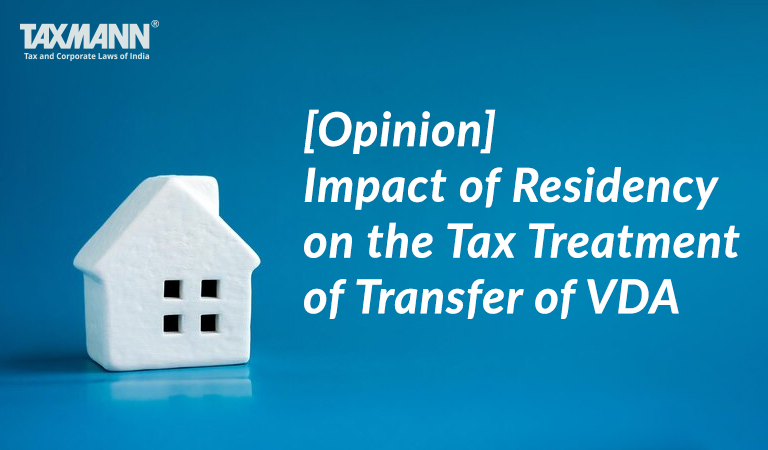[Opinion] Impact of Residency on the Tax Treatment of Transfer of VDA
- Blog|News|Income Tax|
- 2 Min Read
- By Taxmann
- |
- Last Updated on 28 November, 2022

Rohith K Rangan – [2022] 145 taxmann.com 133 (Article)
Virtual digital assets, came, conquered and are here to stay. Exhaustively defined in section 2 of the Income-tax Act (“Act”), simply put, Virtual digital assets (“VDAs”) are any information/token generated through cryptographic means providing a digital representation of value which can be transferred, stored or traded electronically. VDAs have waded through the tense waters of the Indian regulatory system into India’s economy, rapidly forming part of people’s economic activities.
The “Crypto Conundrum” series essentially aims to explore several unanswered questions on taxation of virtual digital assets. In this article we will focus on the impact of residency on the tax treatment of transfer of VDAs.
Legal History
Ever since the rise of Bitcoin near the end of the 1st decade of the Millennium, several VDAs have been on the radar of investors and traders globally. The Reserve Bank of India had taken a conservative view on the evolution of VDAs in India advocating against any transactions in VDAs. Spiking several writ petitions, the Hon’ble Supreme Court’s judgment in the case of “Internet and Mobile association of India v. Reserve Bank of India” [2020] 115 taxmann.com 53/158 SCL 448 effectively permitted transactions in VDAs. Thus, started the journey of VDAs in India.
With the urgent need to address the aspects of taxation in VDAs, Finance Act 2022 introduced taxing provisions and TDS provisions for transactions in VDAs.
Legal provisions
As per provisions of section 115BBH of the Act any gains of an assessee on transfer of VDAs is subject to tax at 30% (including applicable surcharge and cess). It is also pertinent to note the following salient points:
- Section 115BBH is a non-obstante provision
- Transfer as defined section 2(47) of the Act applies to VDAs held both as stock-in-trade or capital assets
- No deduction other than cost of acquisition or set off of any loss (including vice-versa) shall be allowed
This provision primarily aids in the setting the taxation rate for transfer of VDAs. For chargeability and scope of income one needs to still refer to the core provisions of the Act namely, sections 4, 5, 6 and 9. A combined reading of these provisions enunciate that residents are taxed on their global income. Hence, it is necessary to deep dive into the legal provisions concerning non-residents.
1. Individuals: Residency is governed by a complex set of intertwined provisions
2. Company: Residency in case of companies other than Indian companies is governed by the place of effective management (“POEM”)
3. Other assessees: Residency is a question of whether during that year the control and management of the affairs is situated wholly outside India. If it is in the affirmative the assessee is a non-resident. This segment includes firms, AOPs, trusts, BOIs, HUFs, etc.
In case of non-residents, income deemed to accrue or arise as per section 9 of the Act is chargeable to tax under the Act. Section 9(1)(i) encompasses income arising through or from any business connection in India, or any property or asset or source of income in India, or through the transfer of a capital asset situated in India. The pointed question arises then, how can the situs of VDA be ascertained.
Click Here To Read The Full Article
Disclaimer: The content/information published on the website is only for general information of the user and shall not be construed as legal advice. While the Taxmann has exercised reasonable efforts to ensure the veracity of information/content published, Taxmann shall be under no liability in any manner whatsoever for incorrect information, if any.

Taxmann Publications has a dedicated in-house Research & Editorial Team. This team consists of a team of Chartered Accountants, Company Secretaries, and Lawyers. This team works under the guidance and supervision of editor-in-chief Mr Rakesh Bhargava.
The Research and Editorial Team is responsible for developing reliable and accurate content for the readers. The team follows the six-sigma approach to achieve the benchmark of zero error in its publications and research platforms. The team ensures that the following publication guidelines are thoroughly followed while developing the content:
- The statutory material is obtained only from the authorized and reliable sources
- All the latest developments in the judicial and legislative fields are covered
- Prepare the analytical write-ups on current, controversial, and important issues to help the readers to understand the concept and its implications
- Every content published by Taxmann is complete, accurate and lucid
- All evidence-based statements are supported with proper reference to Section, Circular No., Notification No. or citations
- The golden rules of grammar, style and consistency are thoroughly followed
- Font and size that’s easy to read and remain consistent across all imprint and digital publications are applied



 CA | CS | CMA
CA | CS | CMA
